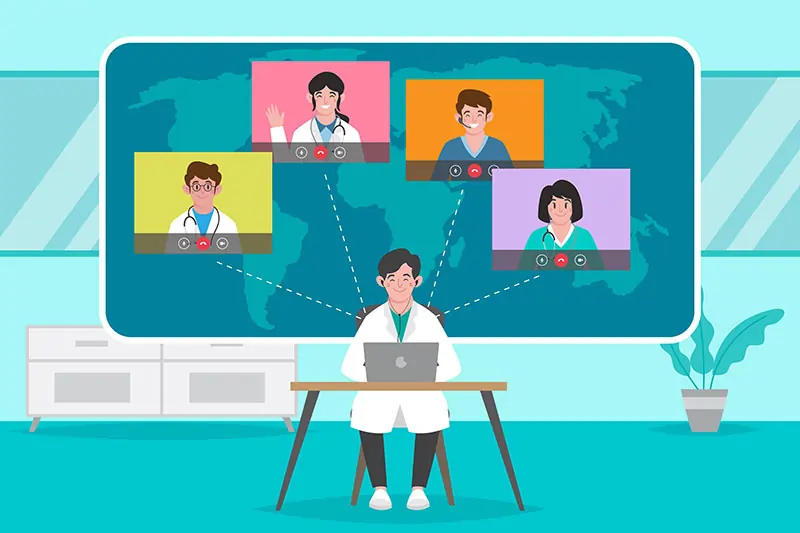Revolutionizing Healthcare with Remote Healthcare Assistants
The healthcare landscape is rapidly changing, fueled by technological innovation and the demand for efficiency in patient care. The greatest change seen here is with reliance on remote support.
Remote healthcare assistants step forward as game-changers offering the promise of combining expertise with technology toward making healthcare services streamlined.
This guide will explore why you should hire a virtual assistant medical. We’ll discuss the benefits it gives to healthcare professionals, owners of a medical practice, and remote work advocates.
The Role of Remote Healthcare Assistants
Definition and Scope of Services
Remote healthcare assistants offer various forms of administrative as well as clinical support services. Their functions include appointment scheduling, handling patient records, addressing billing and insurance claims, among others.
These assistants are trained to handle tasks that require, by tradition, face-to-face meeting; thanks to technology, these can be conducted remotely.
Complementing In-Person Healthcare Services
Remote healthcare assistants do not replace in-person healthcare professionals but complement them.
They free up administrative tasks that take time, meaning the healthcare provider can spend more time with patients. This collaboration of the remote and onsite staff makes health care delivery efficient and effective and results in providing patients with the best care.
The Technology Advantage
Key Technologies Used by Remote Healthcare Assistants
There are many technologies that facilitate the performance of a remote healthcare assistant. A few examples are telecommunication tools, electronic health records (EHR), and secure messaging platforms.
Such technologies ensure easy communication between the remote assistants and the healthcare team to keep all patient-related information updated and accessible.
Improving Patient Care and Administrative Tasks
Technology highly improves patient care as well as efficiency in administrative work. For example, telehealth platforms enable remote health assistants to run patient appointments and follow-ups remotely without having to be present physically.
Secure messaging systems allow for real-time communication, meaning there is less delay in patient care. The tools enhance efficiency and make health care accessible and responsive.
Benefits for Healthcare Professionals and Practices
Increased Productivity and Cost-Effectiveness
Engaging remote health assistants can elevate your productivity by a great margin. Since you can delegate administrative work to remote support, health care providers can engage more of their time doing direct care with the patient.
It leads to better health status for patients and saves time for a practice. Remote healthcare assistants hire also reduce some costs like office space and equipment; therefore, they are cheaper than in-house employees.
Improved Patient Satisfaction and Health Outcomes
Patient satisfaction will increase with its automatic follow-through from the means whereby medical personnel are absorbed focusing attention on treating patients rather than paperwork. Remote healthcare assistants make sure that appointments are scheduled in time, all records are correct, and follow-ups are in time.
This attention to detail enhances the overall patient experience, resulting in good health outcomes and levels of patient satisfaction.
Challenges and Solutions
Common Challenges in Adopting Remote Healthcare Assistants
Benefits apart, there are issues surrounding the implementation of remote healthcare assistants. Some of the most common problems include data security concerns, communication barriers, and difficulties with integrating remote assistants into ongoing workflows. These issues can progress into complicating the smooth functioning of healthcare practices if appropriate attention is not given.
Strategies and Technologies to Overcome These Challenges
Fortunately, there are quite a few strategies that can mitigate these challenges.
Cybersecurity measures ensure the safe-keeping of patients’ data. There is always room for improvement in terms of communication between remote assistants and in-house staff. The option to integrate various software solutions helps to smoothly integrate remote assistants in the existing workflow.
These strategies assure that transition to remote support will be smooth and fruitful.
Critical Considerations for Hiring the Right Assistant
When hiring a virtual healthcare assistant, you should consider their qualification, experience, and compatibility with your practice’s needs.
Use suitable candidates with the right certifications, and employ a proven track record in health care settings. Interview in detail to assess their capacity for independent work, technical ability, and communication.
Ensuring a Successful Remote Working Relationship
Building a successful working relationship with a remote healthcare assistant requires clear communication and defined expectations.
Schedule regular check-ins and feedback meetings to ensure that the responsibilities and duties are carried out. Additionally, necessary equipment and resources also have to be at their disposal in enabling them to execute their roles efficiently.
Conclusion
It is clear that acquiring a telemedicine health assistant leads to several benefits. With diverse skills and technology, they raise productivity levels while improving patient’s satisfaction and making healthcare quite effective.
That might be a wise move for healthcare providers to streamline practice operations and spend more time with patients. If that might help, take the next step now: assess the needs of your practice to begin the hiring process with DocVA today.



